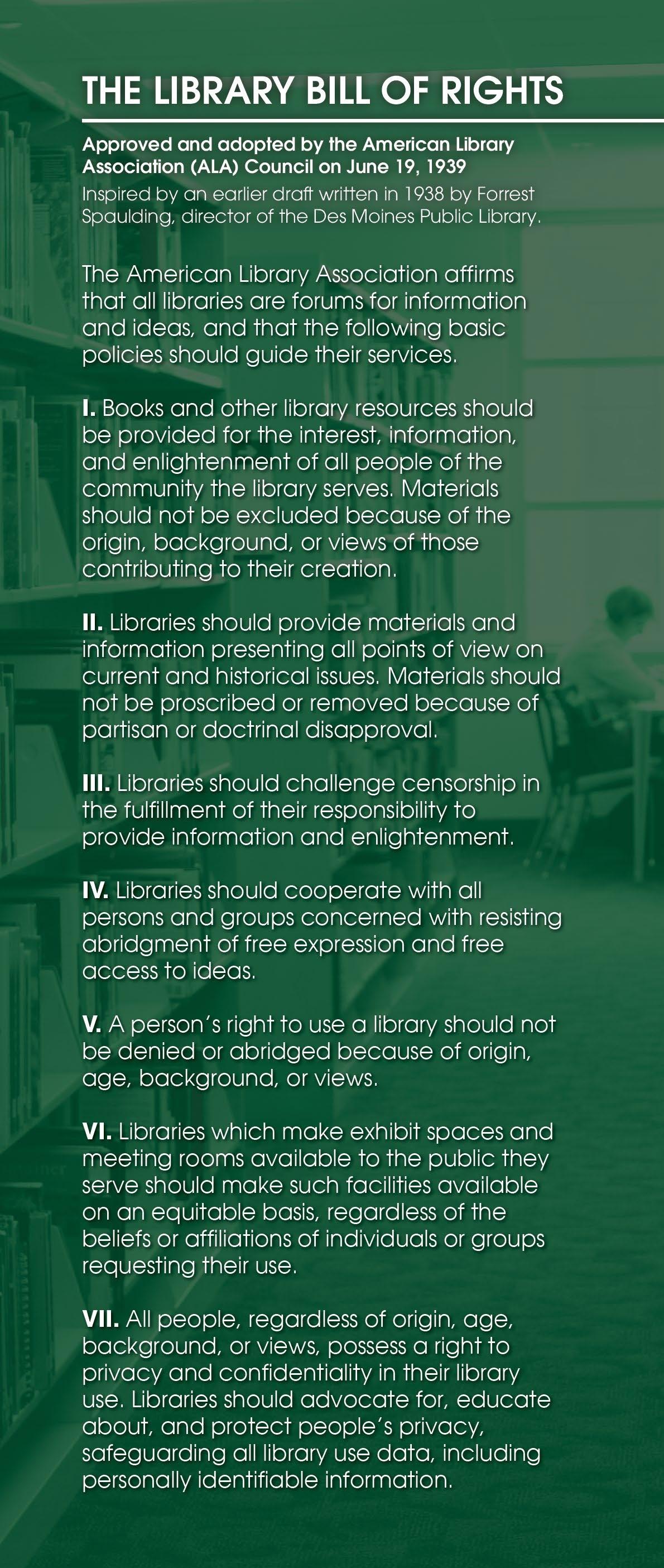Posted by Katie on Saturday, Nov 23, 2024
Libraries transform to meet the needs of their communities. Some of the earliest public libraries in the eastern U.S. included the word ‘free’ in their names to signal a shift from earlier models of libraries as private institutions, which charged membership fees and were typically accessible only to white, affluent men (Garrison, 1979). The Civil Rights Act of 1964, which outlawed segregation in public spaces, further expanded access to libraries.
For over a decade, libraries like the Iowa City Public Library have evolved to meet the changing landscape of digital access, as advancements in technology have made information more accessible to the public than ever before. Libraries have evolved into vibrant community centers designed to address diverse civic and social needs, while continuing to feature even larger and more diverse collections of books for check-out. Central to this transformation is the Library Bill of Rights, approved by the
 American Library Association (ALA) Council on June 19, 1939, during its Annual Conference in San Francisco. The statement was inspired by an earlier draft written in 1938 by Forrest Spaulding, Director of the Des Moines Public Library. The Library Bill of Rights emerged during a time marked by the rise of totalitarian regimes, beginning with a caution: “Today indications in many parts of the world point to growing intolerance, suppression of free speech, and censorship affecting the rights of minorities and individuals” (ALA, Library Bill of Rights).
American Library Association (ALA) Council on June 19, 1939, during its Annual Conference in San Francisco. The statement was inspired by an earlier draft written in 1938 by Forrest Spaulding, Director of the Des Moines Public Library. The Library Bill of Rights emerged during a time marked by the rise of totalitarian regimes, beginning with a caution: “Today indications in many parts of the world point to growing intolerance, suppression of free speech, and censorship affecting the rights of minorities and individuals” (ALA, Library Bill of Rights).
During the 2024 legislative session in Iowa, several bills were introduced that threatened the essential work of libraries, unprecedented in our state’s history. These proposals aimed to undermine library governance, intellectual freedom, and First Amendment rights by restricting access to information. Some even sought to criminalize the professional practices of libraries and librarians, as seen in prior efforts like HF 2176 in 2022. This type of censorship poses a serious risk to preserving the rights, stories, histories, and diverse perspectives that libraries strive to protect and promote.
It is crucial that we stand together to defend our libraries and the essential role they play in preserving and promoting a diverse and inclusive society. Libraries are not just places for books; they are safe havens for all individuals, offering resources and support that reflect a wide range of voices and experiences. By fostering an environment where everyone feels welcome, libraries contribute to the richness of our communities and empower individuals to share their stories. As we face growing challenges to access and expression, it becomes even more important to advocate for these institutions that champion the values of equality and understanding. Take action by reaching out to your local representatives and city council members, expressing your support for library funding and policies that protect intellectual freedom. A personal message about what your library means to you can make a meaningful difference. Together, we can ensure that libraries continue to thrive as beacons of knowledge and inclusivity for generations to come.
And remember, the easiest and most accessible way to advocate for your libraries is to use them and use them frequently.
Garrison, Dee. Apostles of Culture: The Public Librarian and American Society, 1876-1920. New York: Free Press, 1979.

